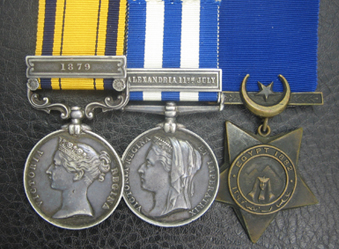
SOUTH AFRICA 1877-79, CLASP 1879 ‘SIGN. 2.CL H.M.S. ACTIVE’, EGYPT 1882-89, DATED REVERSE, CLASP ALEXANDRIA 11th.JULY ‘SIGN. 2. CL. H.M.S. HELICON’, KHEDIVE’S STAR 1882
Yeoman of the Signals Thomas Butler was born in Lambeth, Surrey in February 1860 and entered the Royal Navy as a Boy 2nd Class aboard H.M.S. Fisgard in June 1875. Advanced to Boy 1st Class in January of the following year and to Signalman 2nd Class in September 1878, he was one of 50-odd men landed from H.M.S. Active for service with the Naval Brigade in South Africa in 1879. Present at Inyezane on 22.1.1879, he was ‘knocked down by a bullet that passed through his helmet, prior to receiving a severe gunshot wound in his left thigh’ (Naval Medals 1857-1880, Captain K.J. Douglas-Morris, R.N., refers). Recovering ashore back in the U.K. until late 1880, he was next appointed to H.M.S. Helicon, in which ship he experienced further active service in the Egypt operations of 1882. Advanced to Yeoman of the Signals in August of the following year, but disrated in July 1886, Butler transferred to the Coast Guard as a Boatman in February 1889 and was pensioned with the Rate of Commissioned Boatman in February 1899. An R.F.R. man between 1902-10, he was recalled for service in August 1914 and briefly served in R.N. Shore Establisments as a Signalman prior to returning to the Coast Guard. Latterly employed in Scotland and South-West England, the long-served Butler was pensioned for a final time, with War Gratuity, in early 1919.
174 officers and men, with the addition of 43 Marines of HMS Active, disembarked at Durban on 19th December 1878 to an enthusiastic reception. They then travelled up the coast to the mouth of the Tugela River, where they joined the “Buffs” at the newly established Fort Pearson.
After delays in assembling all his supplies and men, Colonel Pearson was ready to cross the river on the 11th of January and begin the march on Eshowe. When they were within a day’s march of their destination, the Zulus close to the crossing attacked the van of the column over the Inyezane River. In a sharp battle, the Zulus were repulsed and put to flight leaving some four hundred dead on the battlefield. The men of the Naval Brigade were prominent in this victory. Along with men of the Buffs, they formed a line that beat off the main attack from the right horn, while the 24-pounder naval rocket battery cleared a concentration of Zulus around a homestead on the hill to the front. The Gatling gun, after a delay caused by a broken limber pole, was rushed to the British centre on a knoll. Under the command of nineteen year old Midshipman Lewis Cadwallader Coker, the Gatling was brought into action with a minute’s burst into some brush from which the Zulus were causing the British some casualties.
The British realised that the Zulu attack on their right had slackened and that the Zulus were slowly retreating back up Wombane. Pearson then agreed to allow the Naval Brigade, supported by a company of Buffs, to advance and clear the umazi of any remaining Zulus. Led by Commander Campbell, the 'Blue Jackets' tore up the centre spur with guns blazing and drove the Zulus from the umazi. The advance slowed as it met stiff resistance near the top of the ridge and several sailors were shot. The attack stalled about 100 yards from the summit with the Zulus firing not only from the ridge above but also from both flanks. Campbell requested reinforcements but, before they could arrive, he ordered his men to charge again. Yelling and with fixed cutlass-bayonets, the sailors reached the summit and put the Zulus to flight. Up to this point, the Zulus considered that they were winning until;
‘those horrible men in the white trousers rushed up and showered lead on us.’
The Naval Brigade and the Buffs, much to their annoyance, had not been able to keep up with the sailors and now moved to clear Wombane to their right. By now the Zulus had conceded defeat and were streaming away.
Condition VF, little contact and EK to Egypt. Only 15 Wounded or Killed Naval Brigade casualties during the entire Zulu War making this a very rare Naval group!